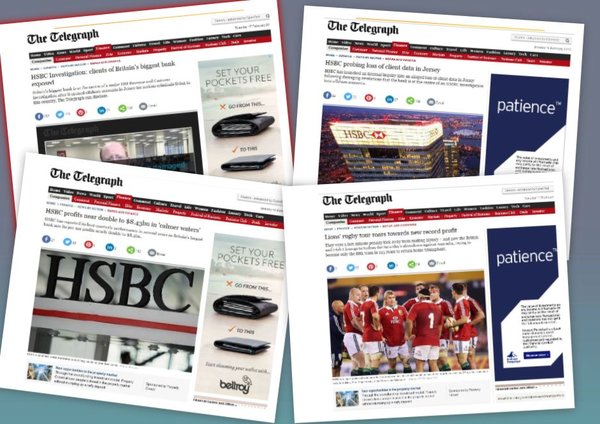Guest blog: Peter OborneWhy I have resigned from the TelegraphThe coverage of HSBC in Britain's Telegraph is a fraud on its readers. If major newspapers allow corporations to influence their content for fear of losing advertising revenue, democracy itself is in peril.
Tuesday 17 February, 2015 Five years ago I was invited to become the chief political commentator of the Telegraph. It was a job I was very proud to accept. The Telegraph has long been the most important conservative-leaning newspaper in Britain, admired as much for its integrity as for its superb news coverage. When I joined the Telegraph had just broken the MPs’ expenses scandal, the most important political scoop of the 21st century.
I was very conscious that I was joining a formidable tradition of political commentary. I spent my summer holiday before taking up my duties as columnist reading the essays of the great Peter Utley, edited by Charles Moore and Simon Heffer, two other masters of the art. No one has ever expressed quite as well as Utley the quiet decency and pragmatism of British conservatism. The Mail is raucous and populist, while the Times is proud to swing with the wind as the voice of the official class. TheTelegraph stood in a different tradition. It is read by the nation as a whole, not just by the City and Westminster. It is confident of its own values. It has long been famous for the accuracy of its news reporting. I imagine its readers to be country solicitors, struggling small businessmen, harassed second secretaries in foreign embassies, schoolteachers, military folk, farmers —decent people with a stake in the country. My grandfather, Lt Col Tom Oborne DSO, had been a Telegraph reader. He was also a churchwarden and played a role in the Petersfield Conservative Association. He had a special rack on the breakfast table and would read the paper carefully over his bacon and eggs, devoting special attention to the leaders. I often thought about my grandfather when I wrote my Telegraph columns. ‘You don’t know what you are fucking talking about’ Circulation was falling fast when I joined the paper in September 2010, and I suspect this panicked the owners. Waves of sackings started, and the management made it plain that it believed the future of the British press to be digital. Murdoch MacLennan, the chief executive, invited me to lunch at the Goring Hotel near Buckingham Palace, where Telegraph executives like to do their business. I urged him not to take the newspaper itself for granted, pointing out that it still had a very healthy circulation of more than half a million. I added that our readers were loyal, that the paper was still very profitable and that the owners had no right to destroy it. The sackings continued. A little while later I met Mr MacLennan by chance in the queue of mourners outside Margaret Thatcher’s funeral and once again urged him not to take Telegraph readers for granted. He replied: “You don’t know what you are fucking talking about.” Events at the Telegraph became more and more dismaying. In January 2014 the editor, Tony Gallagher, was fired. He had been an excellent editor, well respected by staff. Mr Gallagher was replaced by an American called Jason Seiken, who took up a position called ‘Head of Content.’ In the 81 years between 1923 and 2004 the Telegraph had six editors, all of them towering figures: Arthur Watson, Colin Coote, Maurice Green, Bill Deedes, Max Hastings and Charles Moore. Since the Barclay Brothers purchased the paper 11 years ago there have been roughly six more, though it is hard to be certain since with the arrival of Mr Seiken the title of editor was abolished, then replaced by a Head of Content (Monday to Friday). There were three editors (or Heads of Content) in 2014 alone. For the last 12 months matters have got much, much worse. The foreign desk—magnificent under the leadership of David Munk and David Wastell—has been decimated. As all reporters are aware, no newspaper can operate without skilled sub-editors. Half of these have been sacked, and the chief sub, Richard Oliver, has left. Solecisms, unthinkable until very recently, are now commonplace. Recently readers were introduced to someone called the Duke of Wessex. Prince Edward is the Earl of Wessex. There was a front page story about deer-hunting. It was actually about deer-stalking, a completely different activity. Obviously the management don’t care about nice distinctions like this. But the readers do, and the Telegraph took great care to get these things right until very recently. The arrival of Mr Seiken coincided with the arrival of the click culture. Stories seemed no longer judged by their importance, accuracy or appeal to those who actually bought the paper. The more important measure appeared to be the number of online visits. On 22 September Telegraph online ran a story about a woman with three breasts. One despairing executive told me that it was known this was false even before the story was published. I have no doubt it was published in order to generate online traffic, at which it may have succeeded. I am not saying that online traffic is unimportant, but over the long term, however, such episodes inflict incalculable damage on the reputation of the paper. Open for business? With the collapse in standards has come a most sinister development. It has long been axiomatic in quality British journalism that the advertising department and editorial should be kept rigorously apart. There is a great deal of evidence that, at the Telegraph, this distinction has collapsed. Late last year I set to work on a story about the international banking giant HSBC. Well-known British Muslims had received letters out of the blue from HSBC informing them that their accounts had been closed. No reason was given, and it was made plain that there was no possibility of appeal. "It’s like having your water cut off," one victim told me. When I submitted it for publication on the Telegraph website, I was at first told there would be no problem. When it was not published I made enquiries. I was fobbed off with excuses, then told there was a legal problem. When I asked the legal department, the lawyers were unaware of any difficulty. When I pushed the point, an executive took me aside and said that "there is a bit of an issue" with HSBC. Eventually I gave up in despair and offered the article to openDemocracy. It can be read here. I researched the newspaper’s coverage of HSBC. I learnt that Harry Wilson, the admirable banking correspondent of the Telegraph, had published an online story about HSBC based on a report from a Hong Kong analyst who had claimed there was a ‘black hole’ in the HSBC accounts. This story was swiftly removed from the Telegraph website, even though there were no legal problems. When I asked HSBC whether the bank had complained about Wilson's article, or played any role in the decision to remove it, the bank declined to comment. Mr Wilson’s contemporaneous tweets referring to the story can be found here. The story itself, however, is no longer available on the website, as anybody trying to follow through the link can discover. Mr Wilson rather bravely raised this issue publicly at the ‘town hall meeting’ when Jason Seiken introduced himself to staff. He has since left the paper. Then, on 4 November 2014, a number of papers reported a blow to HSBC profits as the bank set aside more than £1 billion for customer compensation and an investigation into the rigging of currency markets. This story was the city splash in the Times, Guardian and Mail, making a page lead in theIndependent. I inspected the Telegraph coverage. It generated five paragraphs in total on page 5 of the business section. The reporting of HSBC is part of a wider problem. On 10 May last year theTelegraph ran a long feature on Cunard’s Queen Mary II liner on the news review page. This episode looked to many like a plug for an advertiser on a page normally dedicated to serious news analysis. I again checked and certainly Telegraph competitors did not view Cunard’s liner as a major news story. Cunard is an important Telegraph advertiser. The paper’s comment on last year’s protests in Hong Kong was bizarre. One would have expected theTelegraph of all papers to have taken a keen interest and adopted a robust position. Yet (in sharp contrast to competitors like theTimes)I could not find a single leader on the subject. At the start of December the Financial Times, the Times and the Guardian all wrote powerful leaders on the refusal by the Chinese government to allow a committee of British MPs into Hong Kong. The Telegraph remained silent. I can think of few subjects which anger and concern Telegraph readers more. On 15 September the Telegraph published a commentary by the Chinese ambassador, just before the lucrative China Watch supplement. The headline of the ambassador’s article was beyond parody: ‘Let’s not allow Hong Kong to come between us’. On 17 September there was a four-page fashion pull-out in the middle of the news run, granted more coverage than the Scottish referendum. The Tesco false accounting story on 23 September was covered only in the business section. By contrast it was the splash, inside spread and leader in the Mail. Not that the Telegraph is short of Tesco coverage. Tesco pledging £10m to fight cancer, an inside peak at Tesco’s £35m jet and ‘Meet the cat that has lived in Tesco for 4 years’ were all deemed newsworthy. There are other very troubling cases, many of them set out in Private Eye, which has been a major source of information for Telegraph journalists wanting to understand what is happening on their paper. There was no avoiding the impression that something had gone awry with the Telegraph’s news judgment. At this point I wrote a long letter to Murdoch MacLennan setting out all my concerns about the newspaper, and handing in my notice. I copied this letter to the Telegraph chairman, Aidan Barclay. I received a cursory response from Mr Barclay. He wrote that he hoped I could resolve my differences with Murdoch MacLennan. I duly went to see the chief executive in mid-December. He was civil, served me tea and asked me to take off my jacket. He said that I was a valued writer, and said that he wanted me to stay. I expressed all of my concerns about the direction of the paper. I told him that I was not leaving to join another paper. I was resigning as a matter of conscience. Mr MacLennan agreed that advertising was allowed to affect editorial, but was unapologetic, saying that “it was not as bad as all that” and adding that there was a long history of this sort of thing at the Telegraph. I have since consulted Charles Moore, the last editor of the Telegraph before the Barclays bought the paper in 2004. Mr Moore confessed that the published accounts of Hollinger Inc, then the holding company for the Telegraph, did not receive the scrutiny they deserved. But no newspaper in history has ever given an unfavourable gloss on its owner’s accounts. Beyond that, Mr Moore told me, there had been no advertising influence on the paper’s news coverage. After my meeting with Mr MacLennan I received a letter from the Telegraph saying that the paper had accepted my letter of resignation, but welcomed my offer to work out my six-month notice period. However in mid-January I was asked to meet a Telegraph executive, this time over tea at the Goring Hotel. He told me that my weekly column would be discontinued and there had been a "parting of the ways". He stressed, however, that the Telegraph would continue to honour my contract until it ran out in May. For my part I said that I would leave quietly. I had no desire to damage the newspaper. For all its problems it continues to employ a large number of very fine writers. They have mortgages and families. They are doing a fine job in very trying circumstances. I prepared myself mentally for the alluring prospect of several months paid gardening leave. Story, what story? That was how matters stood when, on Monday of last week, BBC Panorama ran its story about HSBC and its Swiss banking arm, alleging a wide-scale tax evasion scheme, while the Guardian and the International Consortium of Investigative Journalists published their 'HSBC files'. All newspapers realised at once that this was a major event. The FT splashed on it for two days in a row, while the Times and the Mail gave it solid coverage spread over several pages. You needed a microscope to find the Telegraph coverage: nothing on Monday, six slim paragraphs at the bottom left of page two on Tuesday, seven paragraphs deep in the business pages on Wednesday. TheTelegraph’s reporting only looked up when the story turned into claims that there might be questions about the tax affairs of people connected to the Labour party. After a lot of agony I have come to the conclusion that I have a duty to make all this public. There are two powerful reasons. The first concerns the future of the Telegraph under the Barclay Brothers. It might sound a pompous thing to say, but I believe the newspaper is a significant part of Britain’s civic architecture. It is the most important public voice of civilised, sceptical conservatism. Telegraph readers are intelligent, sensible, well-informed people. They buy the newspaper because they feel that they can trust it. If advertising priorities are allowed to determine editorial judgments, how can readers continue to feel this trust? The Telegraph’s recent coverage of HSBC amounts to a form of fraud on its readers. It has been placing what it perceives to be the interests of a major international bank above its duty to bring the news to Telegraph readers. There is only one word to describe this situation: terrible. Imagine if the BBC—so often the object of Telegraph attack—had conducted itself in this way. TheTelegraph would have been contemptuous. It would have insisted that heads should roll, and rightly so. This brings me to a second and even more important point that bears not just on the fate of one newspaper but on public life as a whole. A free press is essential to a healthy democracy. There is a purpose to journalism, and it is not just to entertain. It is not to pander to political power, big corporations and rich men. Newspapers have what amounts in the end to a constitutional duty to tell their readers the truth. It is not only the Telegraph that is at fault here. The past few years have seen the rise of shadowy executives who determine what truths can and what truths can’t be conveyed across the mainstream media. The criminality of News International newspapers during the phone hacking years was a particularly grotesque example of this wholly malign phenomenon. All the newspaper groups, bar the magnificent exception of the Guardian, maintained a culture ofomerta around phone-hacking, even if (like the Telegraph) they had not themselves been involved. One of the consequences of this conspiracy of silence was the appointment of Andy Coulson, who has since been jailed and now faces further charges of perjury, as director of communications in 10 Downing Street. Urgent questions to answer Last week I made another discovery. Three years ago the Telegraph investigations team—the same lot who carried out the superb MPs’ expenses investigation—received a tip off about accounts held with HSBC in Jersey. Essentially this investigation was similar to the Panorama investigation into the Swiss banking arm of HSBC. After three months' research the Telegraph resolved to publish. Six articles on this subject can now be found online, between 8 and 15 November 2012, although three are not available to view. Thereafter no fresh reports appeared. Reporters were ordered to destroy all emails, reports and documents related to the HSBC investigation. I have now learnt, in a remarkable departure from normal practice, that at this stage lawyers for the Barclay brothers became closely involved. When I asked theTelegraph why the Barclay brothers were involved, it declined to comment. This was the pivotal moment. From the start of 2013 onwards stories critical of HSBC were discouraged. HSBC suspended its advertising with the Telegraph. Its account, I have been told by an extremely well informed insider, was extremely valuable. HSBC, as one former Telegraph executive told me, is “the advertiser you literally cannot afford to offend”. HSBC today refused to comment when I asked whether the bank's decision to stop advertising with theTelegraph was connected in any way with the paper's investigation into the Jersey accounts. Winning back the HSBC advertising account became an urgent priority. It was eventually restored after approximately 12 months. Executives say that Murdoch MacLennan was determined not to allow any criticism of the international bank. “He would express concern about headlines even on minor stories,” says one former Telegraph journalist. “Anything that mentioned money-laundering was just banned, even though the bank was on a final warning from the US authorities. This interference was happening on an industrial scale. “An editorial operation that is clearly influenced by advertising is classic appeasement. Once a very powerful body know they can exert influence they know they can come back and threaten you. It totally changes the relationship you have with them. You know that even if you are robust you won’t be supported and will be undermined.” When I sent detailed questions to the Telegraph this afternoon about its connections with advertisers, the paper gave the following response. "Your questions are full of inaccuracies, and we do not therefore intend to respond to them. More generally, like any other business, we never comment on individual commercial relationships, but our policy is absolutely clear. We aim to provide all our commercial partners with a range of advertising solutions, but the distinction between advertising and our award-winning editorial operation has always been fundamental to our business. We utterly refute any allegation to the contrary." The evidence suggests otherwise, and the consequences of the Telegraph’s recent soft coverage of HSBC may have been profound. Would Her Majesty's Revenue and Customs have been much more energetic in its own recent investigations into wide-scale tax avoidance, had the Telegraph continued to hold HSBC to account after its 2012 investigation? There are great issues here. They go to the heart of our democracy, and can no longer be ignored. |
|

This article was first published on the openDemocracy website and is reproduced with their kind permission.
SubScribe believes that this is an important document about the state of our industry and is most grateful to be able to host it here Other writers
have their say 
Peter Oborne, a man of integrity and courage, has done us a huge service. With the disappearance of secure journalism jobs, most journalists can simply not speak out about journalistic practices without permanently banishing themselves from the industry. As well as the Telegraph allegedly purging proper coverage of HSBC’s role in tax evasion from its pages because of advertising, we now know the Barclay brothers took a loan from this disreputable bank. Rather than take all these allegations seriously, the Telegraph has written a temper tantrum in the form of an editorial, lashing out at “the BBC, the Guardian and their ideological soulmates in the Labour party”.
But there is some honesty in its editorial: that it is “the champion of British business and enterprise”, for example. Almost all media outlets serve this function, even if they are not so candid about it. - Owen Jones, The Guardian 
The schism at the Telegraph was deemed worthy to be the lead story on Newsnight, which is edited by a former Guardian journalist. The BBC and the Guardian have different funding models from the rest of us, allowing their journalists to maintain a lofty distance from the grubby commercial world, and while this story is of interest and some importance within a small(ish) radius, the real world, I’m sad to report, is full of compromise.
The most shocking other claim of editorial interference at the Telegraph mentioned on Newsnight was that the review of a children’s movie had been changed from two stars to three – small beer compared with other news scandals of recent years. - Simon Kelner, The Independent 
What’s more damning and more worrisome is that Oborne can point to articles critical of HSBC and published on the Telegraph’s website being deleted. Without his tell-all resignation, we might never be aware of such stories. It is perhaps ironic that it was Buzzfeed that ran the deleted stories on its site.
It was also Buzzfeed, the site that built its online presence on the very blend of native advertising and original content under discussion here, that reminds us of the futility of suppressing news when there are so many online possibilities. And it is Buzzfeed, and sites like it, that force us to ask whether the boundaries between the advertising and the editorial still exist, and where are they drawn online. What should make Peter Oborne’s resignation a shock and a media scandal is not only the violation of a particular set of journalism’s ideals and paradigms. It is that it introduces obvious questions we have no way to reasonably answer. How often this is happening elsewhere? How do we measure the “tweaks” and “edits” and “changes” happening online at the behest of advertisers or under corporate pressure? And how do journalists, who have built their reputations on the boundaries between advertising and editorial, now repair the paradigms that Oborne’s letter reveals as broken? - Scott Eldridge, of Sheffield University, The Conversation 
There is a major boom in content marketing among brands. The growth is unprecedented. Most publishers are cashing in on this in some shape or form by running content recommendation tools and in-feed native ad formats. But what this also means is that publishers are no longer the only conduit of information. Brands can speak directly to their customers via native advertising and social media. But they still want to work with leading publishers. Why? Because they have audience and trust.
No one wants prestigious publishers to lose that prestige. From an advertising perspective it could be a disaster. The very media that brands are looking to advertise in would be devalued to an extent that they would be seen as irrelevant. There is a trust among readers of quality newspapers – with over a century of print heritage – that any new digital publishing start-up, or brand, just does not have. - Dale Lovell, of Adyoulike, The Drum 
It was not unusual for editorial to throw out or move an ad if it sat uncomfortably with the news on a given page. BA no more wants its ad on a page devoted to an air crash than the journalist placing the story. I suspect that these days pressure would be on editorial to reposition the story rather than the other way about...
If a story, however insignificant, has to move from its optimum position in the paper because of advertising considerations, a line has been crossed. - Advertising v editorial |
How you can be a SubScriber
|
Sign up for email updates (no spam, about one a month)...
|
|
...make a financial contribution
I'd like to subscribe
There will never be a charge for reading SubScribe,
but if you would like to make a donation to keep it going, you can do so in a variety of ways by pressing this button. Thank you. |











